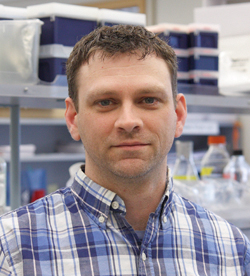
Vollum Institute scientist, Kevin Wright, was recently awarded a grant from Cure CMD to study the synaptic defects of dystroglycanopathy in a mouse model.
Dystroglycan is a transmembrane protein that connects the extracellular matrix and the actin cytoskeleton. Defects in Dystroglycan glycosylation lead to a form of congenital muscular dystrophy referred to as dystroglycanopathy. Patients with dystroglycanopathy can display a wide range of nervous system defects. Previous work from many labs, including the Wright lab, has identified critical roles for Dystroglycan in regulating neuronal migration and axon guidance. Recently, it was discovered that Dystroglycan also functions at subsets of synapses in the brain. The Wright lab will use a combination of imaging and electrophysiological approaches in several mouse models of dystroglycanopathy to define the role of dystroglycan in the formation and maintenance of inhibitory synapses in the hippocampus and cerebellum. They will also test whether restoring dystroglycan function is sufficient to rescue synaptic dysfunction in these models. Ultimately, these results will provide insight into the neurodevelopmental deficits in patients with dystroglycanopathies and test whether AAV-based gene therapies have therapeutic potential.
Cure CMD is a non-profit organization founded in 2008 by three parents whose children were affected by Congenital Muscular Dystrophy. Its mission is to find and fund high potential research and clinical trials which could lead to the development of viable therapies to slow, or even stop, the progression of CMDs.